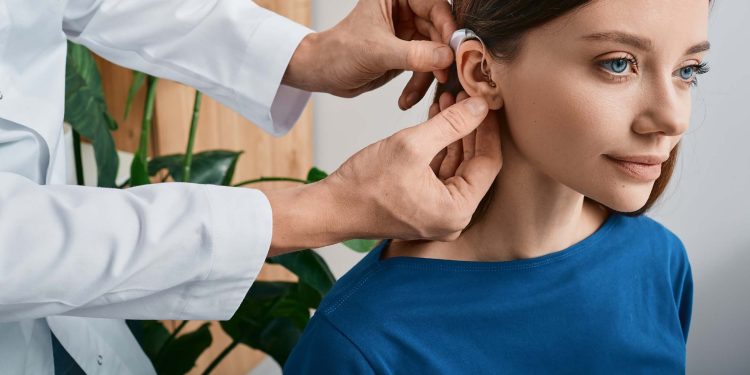Hearing loss is a common problem for older adults. About 33% of adults between the ages of 65 and 75 experience hearing loss, and you have a greater chance of developing auditory issues as you age.
Hearing loss can lead to much frustration, for both the individual and those around them. It can be difficult to have conversations with friends and families, to hear doorbells and alarms and to engage with the world.
Why do many older adults lose their hearing?
“Age-related hearing loss is called presbycusis, and it develops gradually as a person ages,” said Kara Kimberly, MD, a board-certified ear, nose, and throat specialist at Penn Highlands Healthcare. “Changes in the inner ear and the auditory nerve, which relays signals from the ear to the brain, can cause hearing loss, as can long-term exposure to loud noises.”
“Some medical conditions, such as high blood pressure and diabetes, can also play a role,” said Dr. Kimberly. “For example, those with diabetes may experience hearing loss because high blood sugar levels can damage the blood vessels and nerves in the inner ear, while low blood sugar can affect how nerve signals travel from the inner ear to your brain, all of which can impact your hearing.”
Other conditions that may affect the ability to hear include ear infections, heart conditions, stroke, brain injury or tumors.
What are the signs of hearing loss?
The primary symptom, of course, is trouble hearing. But because the loss is gradual, many individuals may have a hearing problem without realizing it. Talk to your primary care provider if you experience any of these symptoms:
- Trouble understanding people talking on the telephone
- Difficulty following conversations when two or more people are talking
- Asking people to repeat what they are saying
- Needing to turn up the TV volume very loudly
- Problems understanding speech because of background noise
- Thinking that other people often mumble
- Issues understanding children and people with higher pitched voices
What can you do about hearing loss?
The first thing you should do if you notice problems hearing is to talk with your primary care provider, who can refer you to a specialist if needed. They may recommend that you see an otolaryngologist (also called ENT) specialist, who will help diagnose why you are experiencing hearing loss and offer treatment options.
One option may be hearing aids, which are electronic instruments you wear in or behind your ear that amplify sounds. Studies show that nearly 30 million American adults could significantly benefit from wearing a hearing aid, yet only 16% of Americans ages 20 to 64 who need them use them.
Some insurance plans now cover a portion of hearing aids. People should research their plan options before visiting their physician.
If you have severe hearing loss, your healthcare provider may recommend cochlear implants, which are small electronic devices that are surgically implanted in the inner ear. Cochlear implants are often recommended for children and adults who are deaf, but some adults who have lost all or most of their hearing later in life can also benefit from cochlear implants.
How can I accommodate people with hearing loss?
If a friend or loved one has hearing loss, there are things you can do to help them better understand you:
- Make a point to include them in group conversations
- Find a quiet place to talk
- Stand in good lighting and use facial expressions or gestures
- Face the person and speak loudly and clearly
- Do not hide your mouth, eat, or chew gum while speaking
- Repeat yourself when using different words
- Make sure only one person talks at a time
- Be patient and relaxed
The experienced team at Penn Highlands Healthcare is here to help anyone experiencing hearing loss. Penn Highlands’ otorhinolaryngologists (ear, nose and throat specialists) provide comprehensive care for a wide range of hearing issues and other conditions affecting the ear. For more information, visit www.phhealthcare.org/ent.



